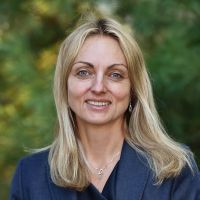
At school, students are often categorized by themselves, their teachers or their peers as “Humanities kids” or “STEM geeks.” Labeling people based off their field of interest suggests that you can only have one or the other: that English enthusiasts can’t love chemistry, or history buffs can’t enjoy physics. Dr. Napiorkowska’s “Science in Literature: Being Human” elective for seniors defies this concept, answering the questions of philosophy with developments in science.
Dr. Napiorkowska developed her Science in Literature course at the Lawrenceville School in New Jersey, where the course became so popular that she was able to teach two full sections. Napiorkowska explained that “students are interested in the course once they get into some of the deeper, more difficult questions because they’re so personal.” Napiorkowska clarifies that “when you talk about consciousness and you talk about the strange ways in which our brain seems to produce consciousness but we have no idea how, suddenly it becomes very personal and people care more about it than just as a thought experiment.” This personal aspect is clear when you examine the guiding questions of the class, such as: what is a human being? why are humans valuable? how do we understand our inner lives? what should our ethics be? As Napiorkowska put it, “These used to be just historically traditional philosophical questions, but now science is really weighing in on them.”
While describing the class environment, Napiorkowska mentioned that “historically, English didn’t evolve to be able to reference the ways in which we exist and how our minds are. So, during Science in Literature, we come up against that limit quite a lot, and we have to reassess our language.” Napiorkowska forces her students to truly contemplate the significance of words and where personal associations with them stem from.
The same concept applies to human consciousness, which Napiorkowska questions. “When you look at neuroscience,” she explained, “there is nothing in the brain that corresponds to a self because there’s no physical structure, it’s not there. When we look into damaged brains, there seem to be these occasions in which there are multiple selves there or parts of selves disappear. If we were to change language to reconceptualize based on what’s actually happening in the brain, we would speak in terms of verbs: for example, I would be Marta-ing”.
Such a complex course warrants a unique final assessment. For their major Science in Literature grade, students are asked to write a paper based on one of the topics from class and present it as a TEDxSLS talk. Napiorkowska explains that “the structure of Science in Literature is lab-like; it involves playing with ideas and experimenting. There are no answers to the questions debated because no one has them.” So, developing a final test for this course would be impossible because there are no definitive answers. Overall, whether you’re invested in humanities, sciences or fall somewhere in between, Science in Literature provides an opportunity to answer interdisciplinary questions in a creative format.






![iStock. (n.d.). Anonymous business partners making handshake in shadow [Photograph].](https://digitalsentinel.org/wp-content/uploads/2025/04/Screenshot-2025-04-16-at-3.42.57 PM.png)







